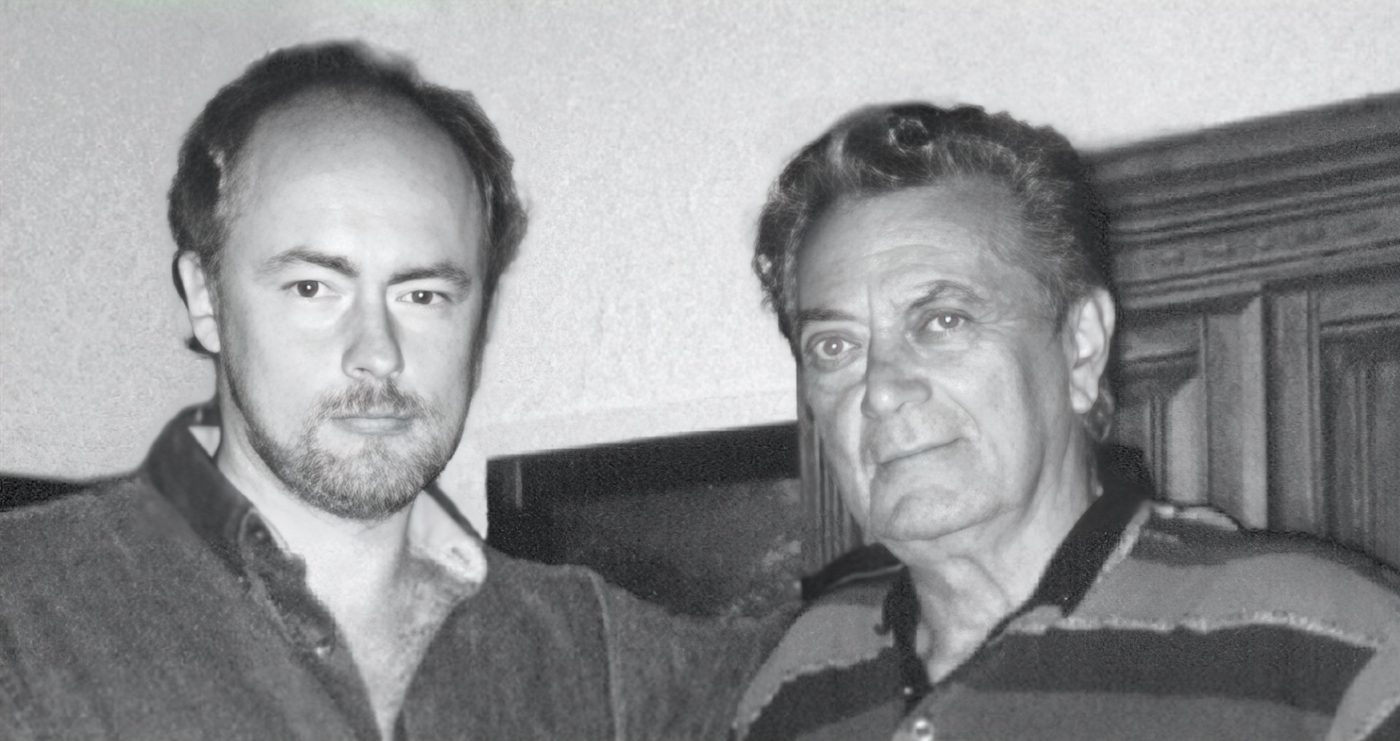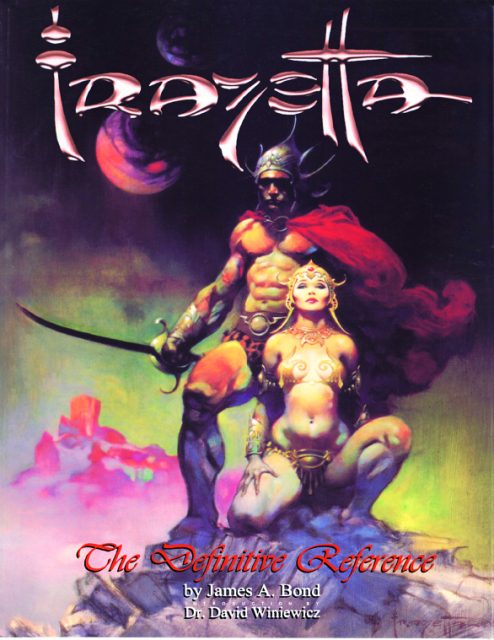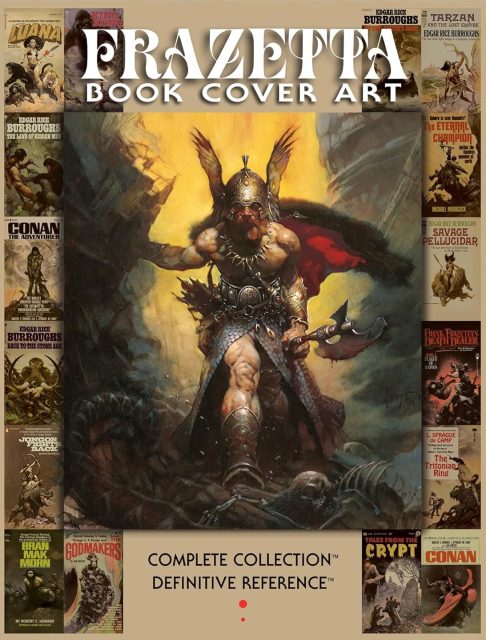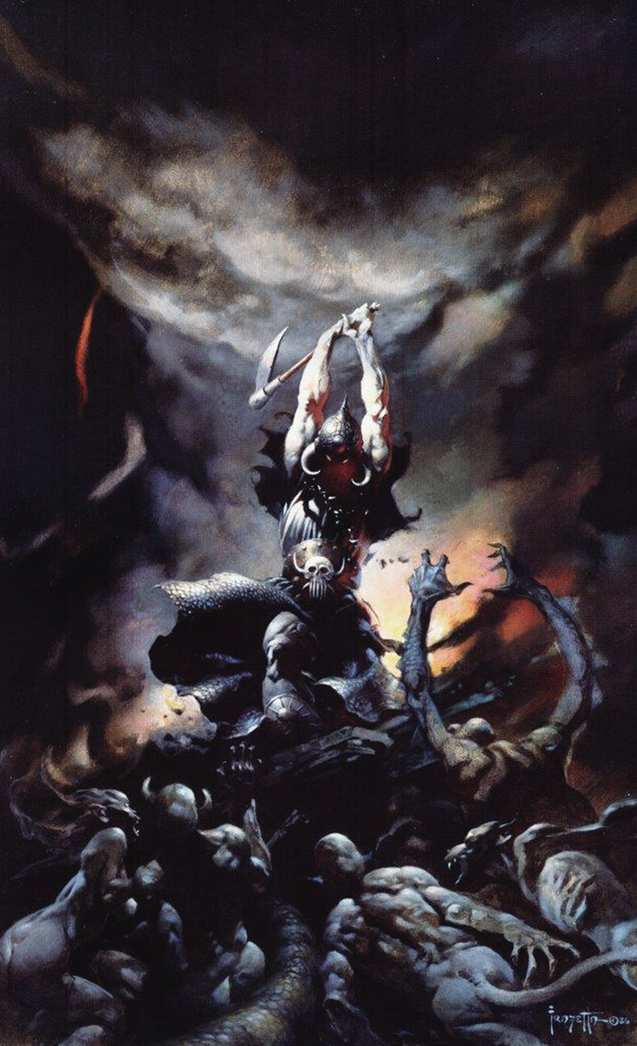Frazetta v. Spurlock is over. The lawsuit, which started with the heirs of Frank Frazetta suing writer and publisher J. David Spurlock over his use of two copyrighted images — and took a startling turn when the court stated that Spurlock had forged a document (an assertion he denies) — ended with a judgment in favor of the plaintiffs. On Aug. 29, U.S. District Court Judge William F. Jung ordered Spurlock to stop using the two images without authorization, destroy his remaining inventory of the book, and pay statutory damages of $20,000 as well as court costs and attorney’s fees.
The judge’s order closes the book, at least for now, on the lengthy and often contentious relationship between Frazetta Properties, LLC, which represents the heirs of the late artist, on one side and J. David Spurlock and his publishing company Vanguard on the other.
In the beginning, there was … a lawsuit
Frazetta is one of the most famous artists of his generation. Born in 1928, he started out drawing comics when he was still a teenager, at a time when comics were a throwaway medium. It was his later work, particularly his fantasy paintings and book covers for pulp classics such as Conan the Barbarian and Tarzan of the Apes, that brought him widespread notice, and he lived to see his work not only respected but sought after by a large audience. It has only grown more valuable since his death in 2010; on September 12, 2025, his painting Man Ape, which was used as the cover of a Conan the Barbarian book, sold at auction for $13.5 million.
Spurlock is a scholar and writer and the owner of Vanguard Productions, which publishes books about well-known artists, including Neal Adams, Wally Wood, Hal Foster, Carmine Infantino, and John Buscema. He taught illustration and design at the University of Texas, Arlington, from 1986 to 1996, then moved to New York, where he taught at the Joe Kubert School and the School for Visual Arts. He met Frank Frazetta and his wife Ellie around 1995. “He was very moved to learn that I had been teaching on the subject of his work at the university level since the '80s,” Spurlock told the Journal. “Illustration was a rare subject for universities in the '70s and '80s and fantasy illustration like Frazetta's, even rarer.”

The legal problems began in 2008, shortly after Vanguard published Frazetta: The Definitive Reference, by James Bond and David Winiewicz. According to Spurlock, who told the story in papers filed during the subsequent lawsuit, Bond had met with Ellie Frazetta and made an agreement with her to publish the book. Ellie also introduced Bond to Spurlock, suggested that Vanguard publish the book, and even asked that they change the dedication (from Robert E. Howard to Frazetta’s fans). Nonetheless, after the book was published, Frank Frazetta filed a $2 million lawsuit against Spurlock and Vanguard, claiming they used the artist’s name and signature without his approval. Spurlock denied that, pointing out that Frank Frazetta had posed for a photograph with a mockup of the book. He filed a countersuit against Frank Frazetta and a crossclaim against Ellie.
These lawsuits came at the beginning of a difficult time for the Frazetta family. Frank Frazetta Sr. was in ill health, having suffered several strokes, and Ellie died in July 2009 after a year-long illness. In December 2009, Frank Frazetta, Jr., was arrested by Pennsylvania state police and charged with theft, burglary, and trespass after, according to news reports, he and two other men used a backhoe to break into the family-run Frazetta Museum and were stopped as they were loading 90 paintings, with an insured value of $20 million, into the younger Frazetta’s trailer and SUV. Frank Jr. told the police that his father had told him "to enter the museum by any means necessary to move all the paintings to a storage facility," but the elder Frazetta, who was in Florida at the time, denied that. The CBC reported that Frazetta’s other three children, Bill, Holly, and Heidi, claimed to hold the rights to their father’s work and were suing Frank Jr., alleging that he planned to sell the artwork to benefit himself; Frank Jr. countersued, claiming his siblings were trying to cut him out of his father’s estate, sell everything off, and leave him with nothing (Frazetta Sr. was not involved in these lawsuits).
In the end, the family sat down with a mediator and on April 23, 2010, they announced that they had worked things out, saying, “Frank Frazetta is pleased to announce that all of the litigation surrounding his family and his art has been resolved. All of Frank's children will now be working together as a team to promote his remarkable collection of images that has inspired people for decades.” Frazetta Sr. died less than three weeks later, on May 10. After his death, the Frazetta estate was split up, with the rights to his work residing within Frazetta Properties, LLC, as well as the individual heirs.
In the meantime, the Frazetta family and Spurlock also came to terms. In March 2010, they settled the lawsuit and signed two agreements. One, the “Two Book Agreement,” allowed Vanguard to publish two new Frazetta books, one of his sketches and one of his photographs. The other, the “Frazetta Endorsement & Trademark License Agreement,” gave Spurlock/Vanguard the right to publish seven books of Frazetta’s art: The two books mentioned in the other agreement, four collections of Frazetta’s public-domain comics, and Frazetta: The Definitive Reference, including updated and revised editions. The agreement also allowed Spurlock to use Frazetta’s signature and endorsement for these books and to develop a Frazetta brand and logo, with the trademark to be co-owned by Frazetta and Vanguard. The contract was to be valid “in perpetuity,” provided that Vanguard did not breach the terms.
With that settled, Vanguard went on to publish a number of books under the Vanguard Frazetta Classics imprint.
The federal case
In November 2021, Spurlock announced a new book, Frazetta Book Cover Art: The Definitive Reference, which would reproduce every one of Frazetta’s book covers, one to a page, in chronological order, along with publication information, commentary and more.

Five months later, in March 2022, Holly and Heidi Frazetta and Frazetta Properties sued Spurlock and Vanguard in U.S. District Court for copyright infringement, claiming the book used two Frazetta paintings, Death Dealer II and Death Dealer V, without authorization and asking the court to stop publication of the book (which was due to be released on June 28, 2022), to impound and dispose of all existing copies, and to award the Frazettas monetary damages.
The lawsuit focused on those two images out of about 100 in the book because they were registered with the U.S. Copyright Office, Frazetta Girls director Joe Weber explained in an email to TCJ. (Frazetta Girls is a separate company set up by Holly Frazetta and her daughter Sara Taylor.) While the U.S. Copyright Law of 1976 states that copyright exists from the time a work is created, the copyright holder cannot sue for infringement unless the copyright is registered. Registration also allows the owner to sue for statutory damages of up to $150,000 per work.
“[T]o be clear,” Weber told the Journal, “all of Frank Frazetta’s works are protected by copyright under U.S. law, regardless of registration status, and many others are also covered by registrations held through different publishing partners (for example, with properties like Conan, Edgar Rice Burroughs, Vampirella, and EC Comics).”
There’s a cautionary tale here for creators: Spurlock questioned the validity of the copyrights because they were filed long after the images were created (Death Dealer II was first published in 1988 and Death Dealer V in 1990, but the copyrights were not registered until 2009) and demanded to see evidence of a transfer to Frazetta Properties, LLC. The back-and-forth arguments over this consumed time and legal fees, but in the end, the judge concluded that the copyrights were valid, and that Frazetta Properties was the copyright holder. However, because Holly and Heidi Frazetta were not listed on the registrations, he dropped them from the lawsuit.
Spurlock also claimed that his use of the images was fair use, that the 2010 agreement allowed him to publish the book, and that Frazetta: Book Cover Art was a revision of Frazetta: The Definitive Reference and thus permitted under the agreement. Both the paintings in question had appeared in Frazetta: The Definitive Reference.
The judge disagreed. In February 2024 he ruled in favor of Frazetta Properties on summary judgment (meaning the facts were not in dispute), stating “The uncontested evidence shows that Defendants infringed Frazetta Properties’ copyright in Death Dealer II and V, and that use of the protected work was not allowed by prior license or permitted by the fair use doctrine.” Regarding Spurlock’s argument that Frazetta: Book Cover Art was a revised edition of Frazetta: The Definitive Reference, the judge stated that the books had different titles, authors, and copyright dates, and concluded “On this evidence, a rational trier of fact could find that Frazetta Book Cover Art is an entirely different book.”
It looked like Frazetta Properties had won their case, but the lawsuit wasn’t over yet. In July 2024, Spurlock filed a response that relied heavily on a single email from 2015. And that’s when things started to go off the rails.
The fateful email
Like Poe’s purloined letter, the email, dated Jan. 14, 2015, was hidden in plain sight. Spurlock had attached it to an affidavit filed in November 2023, but neither side made any further reference to it until July 2024, when Spurlock argued that the email was evidence of the agreement between the two parties and raised a factual issue that should have precluded the summary judgment.

The email is addressed to Frank Frazetta Jr., Dark Horse, and Diamond Comics Distributors, and purportedly signed by William, Heidi, and Holly Frazetta as well as by Spurlock. The first line gets right to the point: “VANGUARD is the only AUTHORIZED publisher of books predominantly featuring Frank Frazetta art.” It goes on to state “Vanguard is the exclusive, authorized book publisher of artwork copyright Frank Frazetta and/or Frazetta Properties LLC.”
“In early 2015, Frazetta Properties’ members learned that Frank Frazetta Jr. was in talks with Dark Horse Comics to publish a book featuring Frank Frazetta’s artwork” Spurlock told TCJ. “Bill Frazetta called me and requested me to help him draft the wording of correspondence to be sent to Frank Frazetta, Jr., and the heads of Dark Horse Comics and Diamond Comics Distributors.”
“The wording was approved by Bill Frazetta during our telephone call,” he said. “I attached the letter to an email to Bill Frazetta specifically stating ‘Letter attached. To save having to mail it all over, I inserted your signatures from our agreements. That will suffice with your approval.’ The digitally inserted signatures, confirmed in that vintage 2015 email, were done solely as a convenience for Frazetta Properties, for expediency’s sake, as Frazetta Properties’ members live in different states.”
“I had no immediate recall on the subject of the signatures,” he added, “and it did not strike me as an issue then. At any rate, Frazetta Properties, or at least manager-member Bill Frazetta, have had the Dark Horse letter since January 2015.”
Not so, countered Weber. “The email was never sent to Dark Horse,” he told the Journal. “Furthermore, the email he submitted was actually never received by William despite Spurlock producing it almost two years after the suit was filed … Also, William would not be able to ‘approve’ someone copying and pasting other parties' signatures (Heidi and Holly) without their consent — which again was never given. Heidi and Holly's affidavits state the same.”
In their response to the court, Frazetta Properties argued that the email wasn’t significant to the case, stating (somewhat ungrammatically) that it “is not contractual and is not a meeting of the minds on anything other than the Frazettas who signed the letter mutual desire not become involved in a lawsuit filed against them by David Spurlock.”
“The litigious nature of Defendants is what caused them to sign the letter that was addressed and sent to their brother,” they added.
Nonetheless, the judge withdrew the summary judgment, taking away the Frazettas’ win, and set a trial date for July 2025.
Then, as Spurlock’s lawyer, Leigh McMillan Williams wrote: “Jack Merritt [the Frazettas’ lawyer] dropped the ‘bombshell’ accusation of forgery of the Dark Horse Letter in a very dramatic manner to Magistrate Judge Porcelli at the hearing on Defendants’ Motion to Compel on Feb. 18, 2025.”
Frazetta Properties followed that up on March 31 with a motion that stated: “Plaintiff seeks Sanctions and Dismissal for the bad faith act of creating a Forged Document that constituted a fraud on the court, which the Honorable Judge Jung relied upon to reverse the Summary Judgment entered against Defendants.” The filing included an affidavit from forensic expert Harold McFarland, stating that he believed the signatures on the 2015 email were copied from the 2010 agreement, and his detailed analysis of the document. In addition, Heidi, Holly, and William Frazetta, all filed affidavits stating they had never seen the letter before, had not signed it, and believed their signatures had been copied from the 2010 agreement.
Spurlock filed his comeback the same day. The email, he said, “was never a matter of mystery, let alone forgery.” In a second affidavit, he spelled out his account of what happened: “I attached the letter to an email to Bill Frazetta specifically stating ‘Letter attached. To save having to mail it all over, I inserted your signatures from our agreements. That will suffice with your approval.’ The digitally inserted signatures, confirmed in that vintage 2015 email, were done solely as a convenience for Frazetta Properties, for expediency’s sake, as Frazetta Properties’ members live in different states.” [Emphasis in the original.]
On April 2, the judge, sounding exasperated, ordered the defendants to respond directly to the Frazettas’ accusations, saying, “The sanctions motion asserts forgeries by photocopy, and alleges that signatures were forged by jpeg or photocopy. These are serious allegations. These allegations need to be addressed, head-on without evading the issue in the response.”
Instead, a few days later, Spurlock withdrew the email and the motion for reconsideration that depended on it. On June 2, Judge Jung reinstated his summary judgment in favor of Frazetta Properteis and granted their motion for sanctions. However, in his final decision, the judge awarded statutory damages of $20,000, rather than the $300,000 requested by Frazetta Properties, because he accepted Spurlock’s argument that he believed in good faith that his use of the images was fair use and he did not “willfully” infringe the copyright. Jung also awarded Frazetta Properties $68,784 in fees and $9,170.61 in costs, and he ordered that Spurlock stop the infringement and destroy Vanguard’s remaining inventory of the book. The Vanguard website now lists Frazetta Book Cover Art: The Definitive Reference as “Unavailable – Out of Print” and Frazetta: The Definitive Reference as “Sold Out.”

The end …?
“This lawsuit is a clear message that no one can profit from Frank Frazetta’s work without proper authorization,” Weber told TCJ. “In this case, Mr. Spurlock even went so far as to present a forged letter with copied signatures, which the court recognized as an attempt to mislead lawyers and the court itself. That kind of misconduct not only disrespects Frazetta’s legacy but also harms the very artists these self-styled ‘advocates’ claim to protect.”
Spurlock continues to maintain he that he had no intention to mislead the court, saying, “I have no ability to travel back a decade in time to fabricate documents for the purpose of defrauding Frazetta Properties or the court. I originally gave my attorney the Dark Horse Letter in good faith as evidence of the parties’ same understandings over the years, no more, no less.”
As to the ruling, he said, “We fear that for a ruling to contrast so, with both our contract and fair use copyright standards, it could have a chilling, if not devastating effect on the future of academic works studying the visual arts. For every good and noble reason congress passed the statute and for every reason in every court ruling supporting fair use, which was created to foster and protect American culture and community, we plan to file an appeal.”
Spurlock’s statement hints at a lingering disagreement: He maintains that the 2010 agreement allowing him to continue to publish Frazetta: The Definitive Reference is still in force, even though Frazetta Properties terminated the agreements in 2018. Spurlock sued Frazetta Properties, Frazetta Girls, Holly Frazetta, and Sara Taylor over that termination in 2019, and the court found in the Frazettas’ favor in 2023, but Spurlock disputes that, telling TCJ, “[T]he attorneys interpreted the jury as saying the ‘2-Book Agreement’ was now null and void. But my recollection is, that isn't actually specified in the ruling.”
Weber interpreted the 2023 verdict differently. “The jury found that he did not comply with his obligations under the agreements and it did not award him any damages for that claim,” he said. “If the jury agreed with him, it would have awarded damages and he would have continued to try to publish books under the old agreement. Moreover, he would have tried using it in the federal case.” (In a sense, he did, as the 2015 email would have been irrelevant had the contract been terminated.)
Nevertheless, Weber, for one, is ready to move on. “For the family, the future of publishing is bright,” he said. “We’ve launched Frazetta Girls Publishing, led by Sara Frazetta, founder of Frazetta Girls, to ensure that new Frazetta books come directly from the estate with the quality and care his work deserves. Our first release, Frank Frazetta: Fine Lines, edited by longtime Frazetta scholar and author Arnie Fenner, launched this past May and has been an immediate success. Arnie has published some of the most celebrated and enduring Frazetta books, and having him on board sets a new standard for the Frazetta legacy. With this foundation, we are developing a number of new premium projects that will present Frank’s art to fans in ways they’ve never experienced before.”
The post Death Dealers in court: The Frazetta lawsuit against Vanguard and how an email led to forgery accusations appeared first on The Comics Journal.

No comments:
Post a Comment